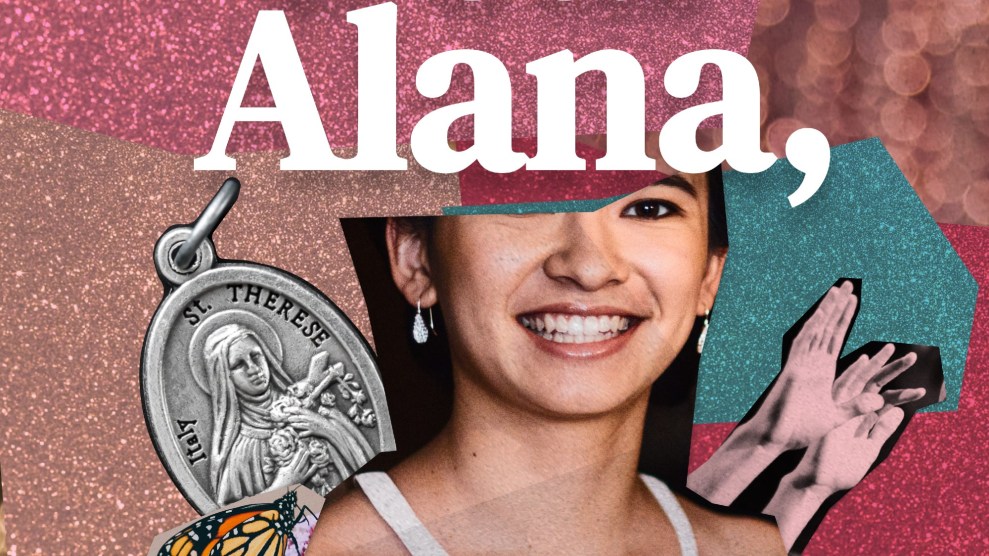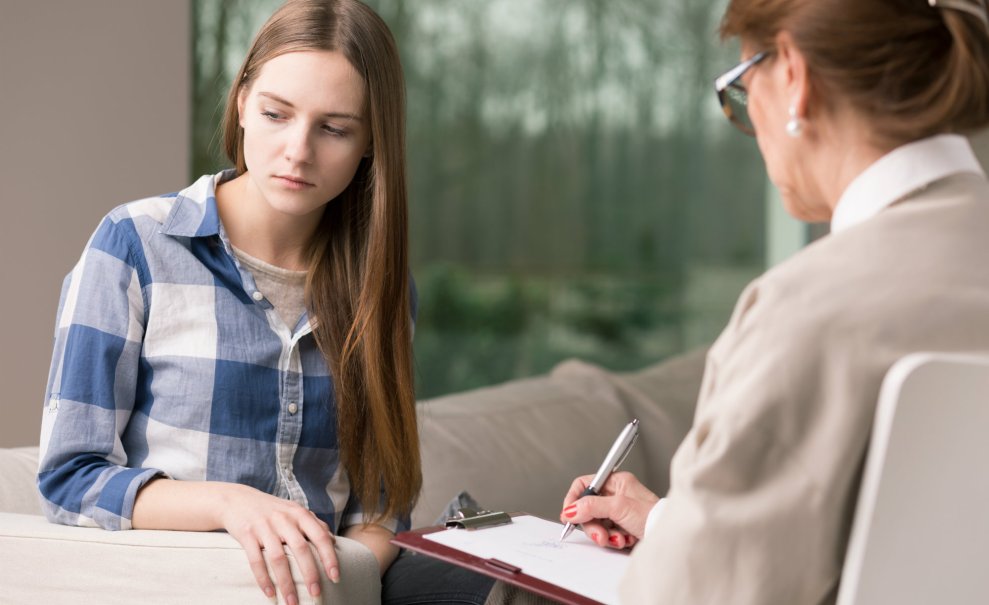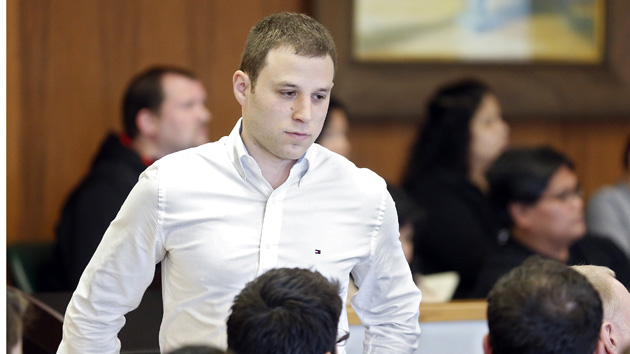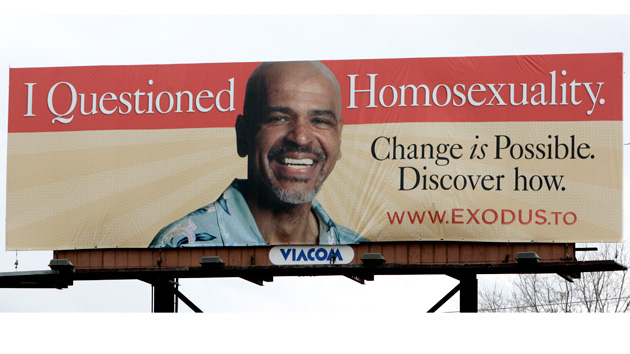
Part of the Dear Alana podcast cover art, which includes a photo of Alana Chen. Tenderfoot Studios
On August 2, 2019, Colorado became the 17th state in the US to ban conversion therapy. Four months later, Alana Chen, a 24-year-old Catholic woman, died by suicide in Boulder after sharing her struggles with sexuality with church elders and seeking counsel.
Chen’s family believes that the advice she received contributed to her death. And they say that, even if it had been in effect when Chen sought guidance, the conversion therapy ban would not have helped Chen at all. That’s because laws like the one in Colorado always make exceptions for religions organizations.
After her death, Chen’s mother wrote an essay in the National Catholic Reporter about her daughter’s struggle with mental illness and her relationship to the church. “While local church officials deny offering Alana conversion therapy, the message she received from pastoral counseling amounted to the same thing: her attractions were pathological and needed fixing.” That message was drilled into Chen over a seven year period, beginning in 2014, when Chen told a priest that she had same-gender attraction. Hearing the message that her feelings were a “mortal sin,” Chen worked with a variety of church leaders in an attempt to change her sexuality; she ultimately hoped to become a nun. Over that time, Chen was hospitalized at least once for suicidal thoughts.
Months before her suicide, Chen spoke out about the risks of not including experiences like hers in conversion therapy bans. “I think the church’s counsel is what led me to be hospitalized [for self-harming],” she said. “I was feeling so much shame that I was comforted by the thought of hurting myself.” Chen was not alone in those feelings. Conversion therapy has been found to double the risk of suicide.
Simon Kent Fung, a gay Catholic man over a decade Chen’s senior, felt eerily connected to Chen’s story when he read about it. He’d gone through almost ten years of both church counseling and conversion therapy and similarly struggled with depression. “I felt like I was a one-off case that was particularly damaged and so I felt like very isolated in my experience,” the former tech designer tells me. Everything changed when he read about Chen in 2019, who like him sought therapy in secret in a path to join the ministry. “It just kept on haunting me.”
That connection inspired Fung to better understand Chen’s story, and his own. Fung became close with Chen’s family, spoke with her friends, and pored over the two dozen journals she left behind. His work culminated in a podcast, Dear Alana, which seeks to understand queer religiosity through his and Chen’s experiences. In the process, Fung discovered a community of people overlooked by education and legislation about conversion therapy. In fact, four out of five people who have gone through conversion therapy received it from a religious leader, says UCLA’s Williams Institute.
“In the last few years of making this project, I’ve met many, many people who’ve shared similar experiences.” Fung hopes the podcast will help more people speak out. “I think that the first step really has been for me to work through my own shame.” That’s why, he says, “I want to share my story.”
I spoke with Fung about the two years he spent making this podcast, which was released this week by Tenderfoot TV, and how it changed his views on himself and his spirituality.
How did you come to know about Alana and meet her family?
I learned about the death of Alana Chen by suicide when it happened in 2019. Upon reading her story, I really was struck by a lot of the parallels and a lot of the themes that seem to pop out from her life and mine, being very devout and religious. I went through a similar experience, spending roughly 10 years trying to change my sexual orientation through conversion therapy in my attempt to become a priest. I felt spooked by some ways our stories were similar and ended up reaching out to her mother on Facebook, just offering my own story to her to add support. That began our friendship through texting, emails, and phone calls. When I left my job [in 2021], I was lying awake at 2 am one night and Alana’s story just kept on haunting me and I felt that I would like to go deeper into what happened to her. This podcast is me figuring out what happened to Alana and in the process figuring out what happened to me.
A big part of your podcast is highlighting how conversion therapy is very different from what we think it is. Could you speak more about that?
A lot of people, when they think about conversion therapy, they think of the more coercive and historical versions of it, like electric shock, lobotomies, or things that are very invasive and violent to people. But more commonly today, conversion therapy takes place in a variety of settings. It takes place in therapeutic settings with a licensed therapist, and it can take place in informal or religious settings, like in support groups, church ministries, or live-in centers.
In religious settings, homosexuality is not just a pathology but a spiritual brokenness that needs to be healed through healing prayer or something similar. Most people who’ve experienced conversion therapy today have gotten it in a religious setting, from a religious leader, who is often unlicensed and unregulated. I would say it is psychologically manipulative.
Currently over half of states in the country have conversion therapy bans for minors. These only apply to licensed therapists and counselors. These laws do not apply to pastoral kinds of counseling. The reason behind that is because of First Amendment protections around religious liberty, which make it very difficult to regulate those spaces. What I found is that most people just aren’t aware that this is happening, especially in religious communities. Whenever I shared my story, some of my friends who were in the church were shocked. They had no idea. I think a big reason is because a lot of us do this in secret. Alana and I, we pursued the therapies in secret. In Alana’s case, it was behind her parents’ back.
Oftentimes the secrecy around that is driven by shame. What I want to do in telling the story is to try to break that silence so that people both inside and outside the church can begin to understand the enormous pressures a lot of young people face to “change.”
How do you think the Catholic and larger religious communities are changing and educating themselves with regard to conversion therapy?
There’s a real knowledge gap because a lot of folks are hesitant to talk about these experiences in the religious community. They fear being marginalized. They fear losing their jobs within Catholic institutions and schools. And I think there’s still a lot of work to be done for people to talk about their experiences, share their stories, and support each other. I think a lot of us feel like I did, right until I read Alana’s story. I felt like I was sort of a one-off case, for whom this didn’t work. The shame around this keeps people from talking with other people. And so I think that the first step for me has been to work through my own shame. Being open and honest about these experiences within the church is the first step. A lot of people in my own life don’t know that I spent my 20s pursuing conversion therapy. I feel a little bit nervous about that.
In my journey, I have met all sorts of people who are working on this and care deeply about this in the Catholic space—whether that’s educators, parents, or psychotherapists—who are now starting to be more sensitive to and know how to spot the signs of a lot of these conversion therapy ideologies within the practices of their colleagues. I think it really needs that awareness to start spreading at every level within the church and outside of the church, for people to start recognizing the harm that it is causing.
I know you walked into this process trying to discover more about yourself and about Alana through your mirrored experiences. Do you feel like you’ve walked out of it with some of those answers?
Definitely. I’d say my faith has deepened because of this process. Getting to know Alana, after her death, in an intimate way with her own writing has really helped me to reconcile parts of myself that I feel I had moved on or swept under the rug.
It was roughly 10 years ago when I’d stopped trying to change my sexual orientation. Having to revisit all of that really forced me to come face to face with some of my own demons and some other things that I had excused. I grappled with the same struggles as Alana and seeing her articulate her own conflicts, I was able to see my own struggle more clearly. Sometimes when you see something happening to someone else you kind of empathize with them more than you would if it was happening to you.
I think Alana has touched me from beyond the grave in a way that is not theoretical or even theological. It’s very real. And I feel like she’s helped me come to a deeper integration of these different parts of me.
What does it mean to you to be both queer and religious?
I’m still a practicing Catholic. I think what the process of making this has shown me is that God and faith are a lot bigger than I thought they were. The actual experience of what’s transpired in the last two years has been pretty remarkable for me, and I can only attribute that to what Catholics would consider the presence of something bigger than ourselves.
I think the other thing this project is trying to do is to not show a conclusion, but a journey. It’s possible to be gay and to be Catholic. It’s possible to be queer and Christian, or religious, or a person of faith. I think so often those identities are seen as antithetical or conflicting because of the ways in which our society is structured.
What my and Alana’s stories show is that when you’re in between these two spaces, it can be really hard to hold that tension. It can even destroy you. And I hope that anyone listening will be able to take away that there are other options. I hope that that becomes clear.
This interview has been lightly edited for clarity.
If you or someone you care about may be at risk of suicide, contact the 988 Suicide and Crisis Lifeline by calling or texting 988, or go to 988lifeline.org.















